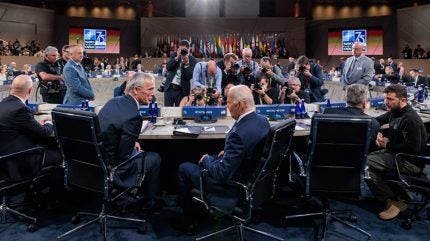
Nato presents a step forward in its collective policy on Ukraine following the Washington Summit in July 2024.
On the one hand the alliance made a €40bn ($43.6bn) military aid pledge to the country within the next year while also pursuing “a greater coordinating role for Nato in training and weapons support.”
These multi-billion-euro funds are a welcomed surety, building on billions in security assistance, led by the US with $53.7bn since the start of the Russia-Ukraine war, €11.1bn from the EU, £7.6bn ($9.86bn) from Britain, and more from other contributors.
However, it is difficult to discern any decisive changes within this latest show of support for Ukraine; a nation on the fringes of the continent battling it out with Russia while feeling the full brunt of fracturing support from some Nato members over the past year. Most notably the US, where the House of Representatives was unable to allocate the funds needed to prop up Ukraine’s forces between the end of 2023 and April 2024.
In that time, Russia had made some land grabs including the much fought over town of Avdivvka.
What is this new coordinating role?
The most important outcome from the Washington Summit was the creation of the Nato Security Assistance and Training for Ukraine. As yet largely undefined, this newfound body appears to add a new responsibility in which the alliance will manage its supplies and training already in play.

US Tariffs are shifting - will you react or anticipate?
Don’t let policy changes catch you off guard. Stay proactive with real-time data and expert analysis.
By GlobalDataHundreds of people will be working within the new body. Among other things, their aim is to enhance interaction with Ukraine, support burden-sharing among the allies and ensure transparency with regard to the contributions.
When asked about the potential impact, and whether the establishment of the new body could be considered escalatory, GlobalData Defence Analyst James Marques provided his thoughts:
“It is hard to say exactly what this entails in its details. Given this is not a huge expansion of what they are already doing, I don’t think it can be credibly described as escalatory. Though, of course part of that is in the eye of the Kremlin – but it is unlikely to produce any real change in tensions.”
Nato says it is not party to the conflict
Nato countries also agreed to strengthen civilian staffing at the Nato Representation to Ukraine in Kyiv and to appoint a Senior Representative as a focal point to ensure adequate coordination between Ukrainian needs, allied support and the multi-pronged efforts of Nato.
Although, the alliance stipulated that it will not have a military presence in Ukraine. “Nato’s stronger role in Ukraine does not make the alliance a party to the conflict,” assured the Norwegian Minister of Foreign Affairs, Espen Barth Eide. “But there is a deeper acknowledgement among the leaders of the alliance that the situation is grave for Ukraine and Euro-Atlantic security alike. The fact that we have reached this agreement for Ukraine is important in and of itself.”



